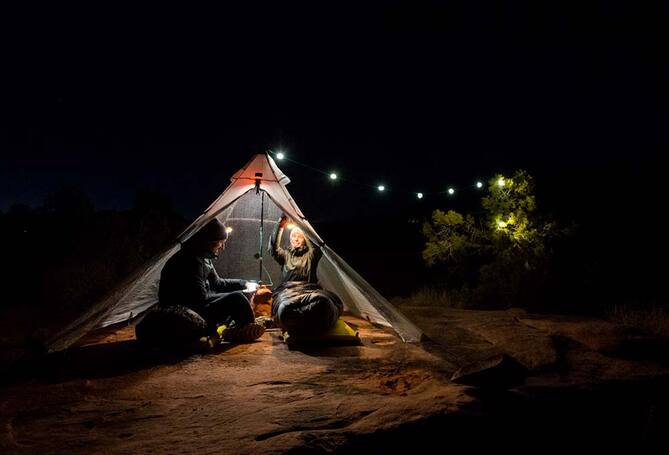Backyard Camping Guide: Visit the Great Outdoors at Home

carousel
Experience a fun getaway without leaving the backyard
Consider the weather
Weather and temperature can change drastically in many areas. A beautiful, warm sunny day can quickly turn into a cool, wet night. When looking for tents and shelters, ensure you include a rain cover or tarp to protect the tent and keep everything inside it dry during showers. Include temperature- and water-resistant sleeping bags and warm clothes for camping during winter or light clothes like vests for warmer days.
A tent with windows helps to provide plenty of natural light and makes the inside of the shelter lively. A skylight or screened ceiling adds fun by providing some great opportunities for laying on your back and gazing at the night sky.
Think about the number of campers
Comfort is key
Pitch tents on relatively flat spaces to avoid sleeping on an incline. Allow enough space to walk comfortably around outside the tent without the risks of tripping over tent stakes and guy lines.
Get a mattress pad to ensure comfortable sleeping. Air pads are lightweight and compact, and they let you customize the firmness via the valves by inflating or releasing air from the inside. Don’t forget to get a hand pump for this task. Self-inflating pads auto-adjust their firmness to save you the hassle of inflation.
Consider sleeping bags and pads that provide enough warmth for average temperatures. Depending on the insulation ability, you can choose pads with an R-value ranging from 0 to 5.5. The higher the R-value, the higher its insulation capacity and heat flow resistance. Below is a table explaining the best R-value for different seasons and conditions.
R-Value | Season and Temperature | Conditions |
0-1 | Hot - Summer | Consistent warm air and ground temperatures |
1-2 | Warm – Late spring or early fall | Cool morning and evening air and ground temperatures – possible mild frost |
3-4 | Cool – Early spring or late fall | Cold morning and evening air temperatures – possible hard frost |
5+ | Cold - Winter | Consistent cold air and ground temperatures – possible frozen ground |
Sleeping bags are rated by temperature and for different seasons:
Sleeping Bag Type | Temperature Rating (Fahrenheit) |
Summer | 30° and above |
3 Season | 15° to 30° |
Winter | 15° and below |
Sleeping bags are also available in a variety of shapes:
- Rectangular – gives you plenty of room to stretch out
- Semi rectangular – Otherwise known as barrel or modified mummy. Available in a variety of shapes but usually rectangular at the bottom and more rounded at the top
- Mummy – A lightweight sleeping bag that provides a snug fit to help increase warmth
- Double bag – A double size rectangular bag that’s ideal for couples
Remember lighting
You’ll need lighting to prolong your camping experience once nighttime arrives. Popular options to consider include battery- or solar-powered lanterns and flashlights. To cover a large space and set up a fun mood, you can opt to hang outdoor string lights in the backyard.
Solar-powered flashlights and portable lights are an economical option to save you the expenses of battery replacement, while battery-powered lanterns are a viable option for areas experiencing minimal sunshine. Another option is USB-charged illumination. You can either charge the light before you embark on your backyard camping experience or use an extension cord with USB ports.
Plan entertainment and food
When planning your backyard camping experience, think about adding a canopy where you can cook on a portable grill and enjoy meals. Be sure to bring a cooler that has the space to hold enough snacks and food for everyone. An easy-to-grill meal or ready-made foods like sandwiches, burgers and hot dogs are a convenient solution. A screen house ― canopy with screened sides ― allows you to enjoy the outside without having to deal with bugs while you eat and socialize, making a great experience for all involved.
For entertainment, campers can opt for active entertainment such as flashlight tag and scavenger hunts or less vigorous activities like roasting marshmallows, singing campfire songs and studying the night sky. Kid-friendly camping stories are a fun way to pass the time when camping with the family.
Prepare for emergencies
Prepare for unexpected injuries by including survival and first aid kits in your tent. Consider a kit with supplies that assist with minor scrapes, burns, small wounds and insect stings. Basic tools include antiseptic wipes, antibiotic ointments and latex-free bandages. Add some pain relief and allergy tablets along with other essential medicines to treat potential allergic reactions.
A compartmentalized kit allows for convenient organization and fast retrieval of the first aid items during emergencies. With compactness comes the convenience of portability and storage in tight areas. You can consider the large size kits to match the potential emergency needs of a crowd of campers.